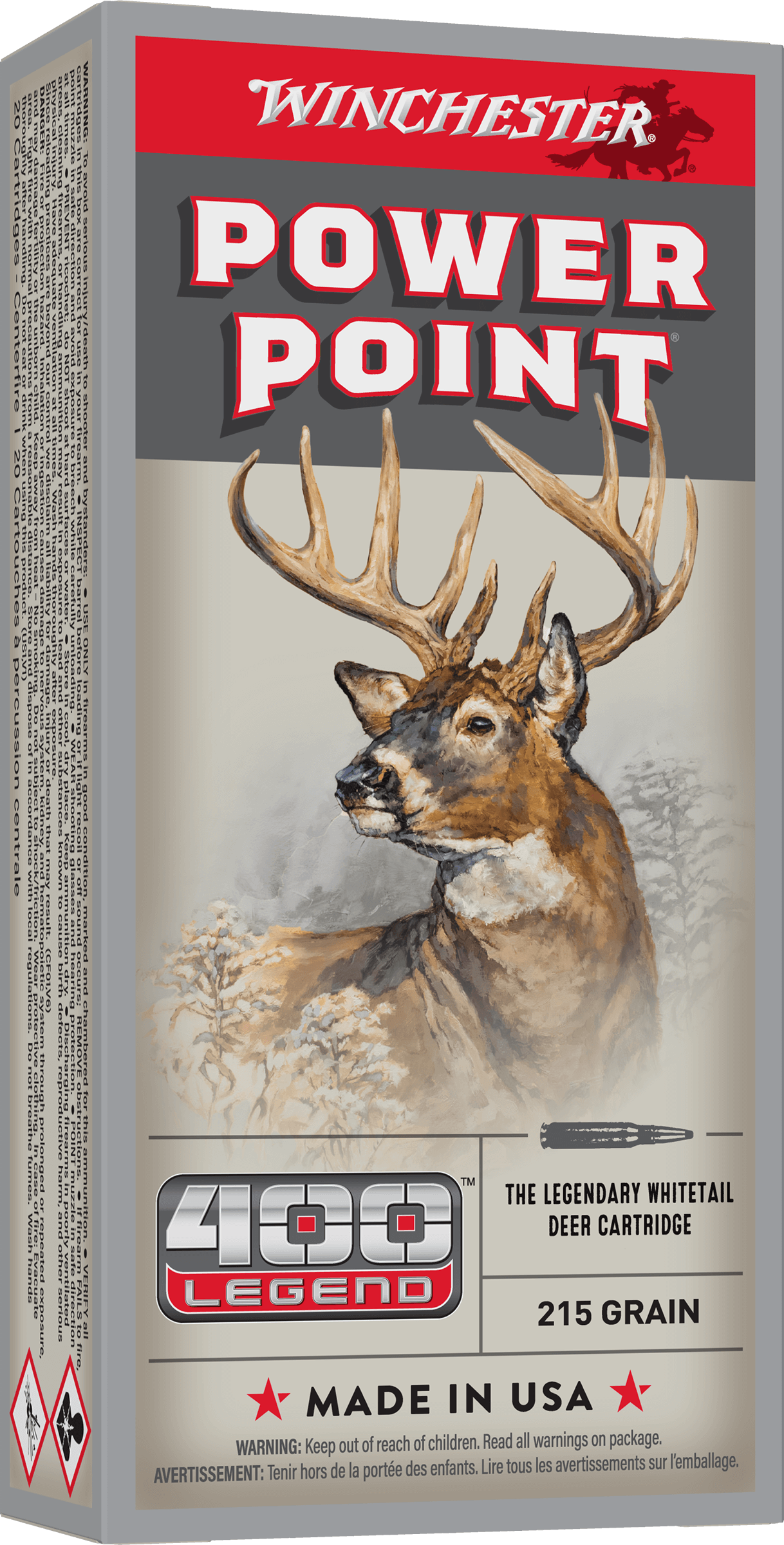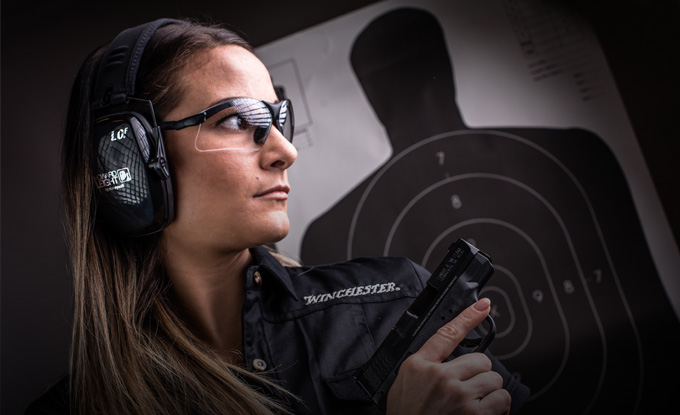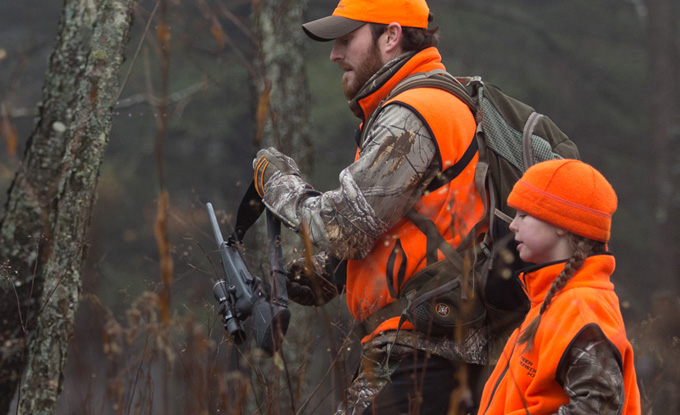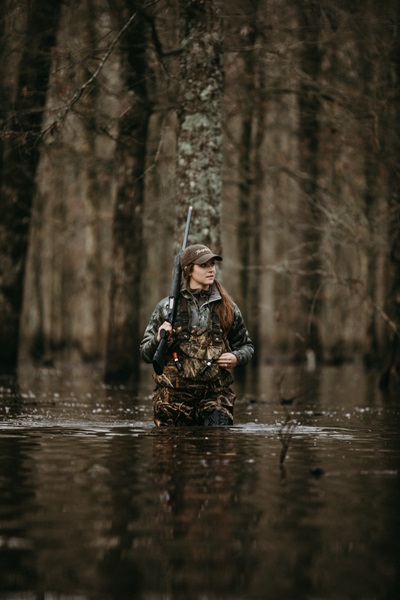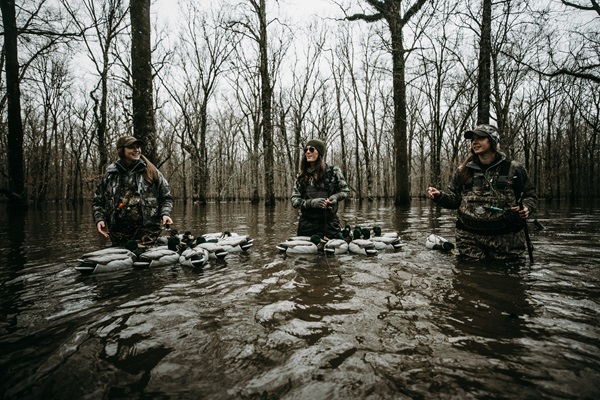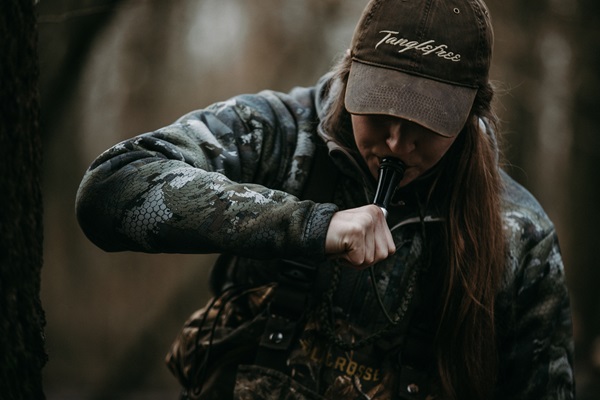Uncharted Waters: Interview with Cara Harper
Cara Harper is one of the featured hunters in “Uncharted Waters,” a film that gives a look into the lives of three female waterfowlers.
No stranger to the camera, Harper has been the host of Ducks Unlimited TV as well as an ambassador for some of the industry’s top brands. Be Alive got the scoop from Harper on her life as a waterfowl hunter and what it’s like to… gasp… duck hunt without a beard.Preventing cookies from being stored on your device may interfere with your ability to view video content.
You can adjust your cookie setting by clicking the button below.
BA: How did you get into hunting?
CH: I grew up a hunter. My family is very involved in the outdoors. My dad used to guide for ducks back probably 20 or so years ago. Duck hunting has always been an integral part of my life. I always wanted to go along with my dad and my older brother, and I didn't see any reason why I shouldn't. I made that very clear and my mom always encouraged my dad to take me. He was more than happy to bring me along. He would elk hunt every year religiously, and I was always asking, "I want to go! Hey! I want to go!" It finally worked. I went once with him in the fifth grade and again in the eighth grade. I skipped school for two weeks and you know what, I learned more in those two weeks than books could have ever taught me. That was something both my parents felt was very important for me growing up. They introduced me to all kinds of adventures: camping, hiking, riding on mules and all of that. I'm 25-years-old now and I've been married for a year and my husband loves hunting as much as I do. We live our life around it, we do it all, from one season to the next.
BA: Arriving at this women’s duck camp. First moments?
CH: So it was actually my first time meeting both Ashton and Kim. I've followed Ashton on social media for a couple of months prior. My husband does competition duck calling and so does her fiancé, so they kind of knew each other through that. She’s got a lot of grit and she's out there with all the guys. She's probably the most knowledgeable female duck hunter that I have met and hunted with. A lot of the times when I take girls duck hunting, it's their first time. It was neat to have that kind of side-by-side experience with her instead for a change.
Kim, she has such a bubbly and outgoing personality! I didn't know anything about Kim and so when I first met her, she was just this beautiful ball of energy with positivity just radiating out of her! I immediately thought “OK I like this girl already!” She loves to be out there hunting, especially with her husband and kids. It was just refreshing for me to see that you can be a duck hunter at any level, at any stage in life.
BA: Sometimes you’re the only woman in camp. What’s been some of your experiences?
CH: I grew up being the only girl in seemingly everything I wanted to do. It wasn't until I got into my 20s that I started finding more and more women that enjoyed hunting and going to camp together. Then later came the ideas of having all girls hunts. So growing up, it never really seemed weird to me to be the only girl. I always had an invite. There was always a spot for me if I wanted it. I will say though, you can definitely tell sometimes when you step into a camp and it's all guys and everybody kind of looks at you and it's quiet. It's like “Hhhhey what's up?” It always takes a little while for guys to kind of warm up to you and realize they can still just hang out and relax. A lot of times, guys kind of try and keep things a little more, I don't know, modest if there's a girl around. They're not going to want to just cut back with the guys like they normally do. I grew up with it, you can say whatever you would say, I've probably heard it before.
“I feel like it's becoming more of the norm now to see a girl in hunting camp and I love that. I love how this stereotype is changing of what a hunter should be.”
BA: In the male dominated hunting industry, we know there’s disadvantages. What are the advantages of being a woman?
CH: We have a different perspective, and I think that actually gives us an edge. We can stand out, or we can be one of the guys. We get to do both. You don't have to put a big gender role into it, and I think that's kind of what this film portrays. Look: We’re a couple of girls, but if we want to go duck hunting, we can go out there just like the guys do. We can set out our decoys, we can call in the ducks. We do the scouting and the prep. We can actually hunt. We're not just people who like to go on a duck hunt; we are duck hunters. That makes you a hunter. Women are the fastest growing demographic, and I think it is more welcoming now than ever. In the past it was always so male dominated and women maybe didn't think that they had a place. Now they can see that they do have a place.
BA: You’re pretty skilled with a duck call. How did you get to this level?
CH: It was probably about five years ago that I decided, “You know what, I love to duck hunt and I'm going to learn how to call no matter what.” Let me tell you, I did a lot of calling in my car. I had a tutorial CD and I would call away. That’s where I felt confident. Nobody was there to judge me. It was just me and I was going at my pace. Then I took what I learned and I got into the woods with my dad and started calling around him. Even though it was just me and him in the boat, I was worried about the guys who were 300 yards over. I thought, “Oh no, they’re going to hear me, I’m not going to sound good and they're going to know that person doesn't know how to call. My dad told me that nobody cared, and even if they did, it didn’t matter.
“You're learning. No one should judge you for just trying to learn how to learn something new.”
Once I got over that initial fear, I moved on to learning how to read the ducks. I learned when to call—it’s not just how to call—and what type of call to use. I got more confident with my calling on DUTV. I said, “Alright I know I can call, I'm not going to worry what these guys think, I'm not going to worry what all the viewers at home think because I have enough confidence in myself that I know I can do this.
BA: So that means you can stop practicing now, right?
CH: Ha! This year I transitioned into a different style call and it's like I had to start all the way over from scratch because blowing a cut down is so much more difficult than other calls. I'm still in the early stages. I’ve been at it a couple of months and it's not my best. I actually got frustrated during this film because I didn't think I sounded like I should have sounded. I got intimidated and then I knew that nobody around me was judging me. Everybody was very encouraging. And so I stopped being in my own head and I just let it out. Ashton and I would practice together and share tips. We started working together and we worked in a pair of ducks and we're able to finish the job. That was really rewarding for us both to know together we were able to do that.
BA: Hunter numbers are declining. What’s the key to creating new hunters?
CH: I think having a mentor is really important for bringing new people into the outdoors. I think joining a conservation group like Ducks Unlimited, Rocky Mountain Elk Foundation, and NWTF is a great place to meet other hunters. Find a local chapter and I’m sure you’ll find a mentor willing to share their knowledge. We’re seeing more adults out there who didn't grow up hunting but they want to learn. Another great program is called BOW: Becoming an Outdoors Woman. It is an all about women teaching women. Many states have a program with classes and excursions. Those women can then go teach their children or their husband, or join their husband or friends who do. I feel like there are so many people who love the outdoors but maybe never thought about being a hunter.
BA: So, what’s in store for 2019?
CH: I'm really excited about next season. My husband and I are actually going to be moving out to Nebraska in a couple of weeks. We’ll be right near Prairie Rock Outfitters, the place my husband and I worked with last this past fall and winter. So we’re going to be able to help out doing more guiding, working and hunting there. I'm also looking forward to going on an elk hunt with my dad, brother and husband in a wilderness area in Colorado that I've hunted with my dad twice before. My dad hunted there for probably 20 years now. So we're going back to this place that is very special for my family, and hopefully we can film some of it.
My husband and I are looking forward to going back to Montana to hunt elk again. We go out just the two of us, no guides, public land. We enjoy the adventure, and we enjoy the struggle. And I will admit, camping with your husband for almost 30 days...we were at wits’ end with each other but we ultimately came out stronger for it.
BA: Final thoughts?
CH: Just be you. Growing up, I was very shy and self-conscious and I let that hold me back from a lot of things. I let it hold me back from really enjoying life in the way that I could be because I was always so worried about what people were thinking. It might sound funny but I was most comfortable when I was hunting. I've really come a long way from being that shy girl. I'm now confident to walk into a room and not know anybody and strike up a conversation. I think I've gained a lot of that confidence through hunting, through calling, through learning how to do things myself. Learning how to be self-sufficient and diligent in the woods transferred over into other areas of my life and really helped me grow as an individual. I've really broken through being shy and I can just be me.

